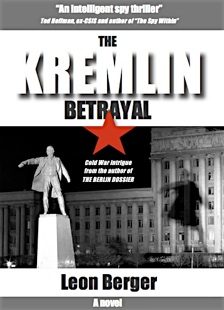Given today’s tiresome climate of post-9/11 "national security" paranoia, this fictionalized account of post-WWII spying shenanigans potentially provides a healthy reminder that such a mindset has its foundation in the Cold War era. The Kremlin Betrayal posits the idea that Stalin was murdered by his own colleague (contrary to the historical recorded death of natural causes). Author Leon Berger presents this assassination as the result of Stalin’s own well-documented obsession with the rewriting of history, coupled with the Western world’s desperate fixation upon undermining the Soviet state and its leader.
The story centres on a gift that Stalin gave Hitler and that Stalin now wants returned so that any hint of friendship between the two is erased. What follows is a series of Keystone-Cops-like antics on the part of both the pre-KGB and the British Secret Service (with a bit of help from the newly formed CIA) to acquire the document and thus undermine the efforts of the enemy. As such, it is an ingenious effort at re-imagining history.
One of the most telling elements of the novel is the depiction of the unapologetic secondment of Nazi SS officers to the service of Western spy agencies, a fact often overlooked in the cultural amnesia found in many of the victorious accounts of the Second World War.
Berger accurately depicts a very different kind of spying apparatus that existed (particularly in the Western World) during this time, a society of amateur spies and reluctant covert heroes that stands in sharp contrast to the professionalized (albeit arguably just as ineffective) spy services of today. The bumbling antics of the novel’s hapless protagonist (a somewhat failed journalist and former part-time Nazi hunter recruited by the zealous British) lends credence to the portrayal of an era that was still adjusting to the need for a permanent, full-time intelligence system that could keep the Red Menace at bay.
However, it’s not clear just what relevance a revisioning of Stalin’s end days can accomplish, in terms of a political theme or comment on the times, beyond simply an interesting plot. Ultimately we are left to wonder why we should care whether Stalin was murdered or not. At the same time, while the book is marketed as a fictional take on Stalin’s death, this isn’t actually what the book is about, focusing as it does on efforts to retrieve Stalin’s gift to Hitler. Stalin’s assassination is simply the aftermath of this attempt, not the central story, and thus the reader is left confused about the novel’s main intent.
The other troubling aspect is the lack of any in-depth exploration of the protagonist, who actually doesn’t appear until well into a third of the chapters. The long exposition leading up to the choice of our hero as the man for the job is actually narrated by the protagonist, without a clear explanation of how he would know about events that happened before he was involved. The author appears to be fascinated by his premise to the detriment of a plausible structure for his story, while the hero is left as something of an enigma.
Finally, another confusing feature is the function of historical fact. While the use of meticulously detailed and exhaustive research is admirable, the reader is left unclear as to what is fact and what is fiction. We are left wondering whether this or that event did indeed happen, or if this or that person is historical or fictional, a disturbing distraction from what could prove to be an intriguing tale.
Praised by an ex-CSIS agent as "an intelligent spy thriller," the novel promises an imaginative concept. Unfortunately, what starts out as a good idea suffers from poor fictional execution. We are left wondering how such a revisioning of the death of one of the most mysterious and reviled figures of 20th century history serves either the canon of political fiction or the historical record, let alone providing illumination on our present-day political analysis. While Stalin’s purpose in rewriting history was clear self-aggrandizement, Berger’s aim in doing the same thing through fiction is murkier.–Laurel Smith
Laurel Smith is a writer, playwright, theatre director and a regular contributor to rabble.ca‘s book lounge.




